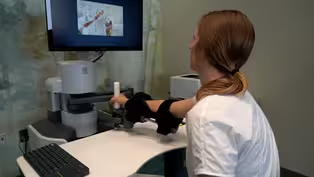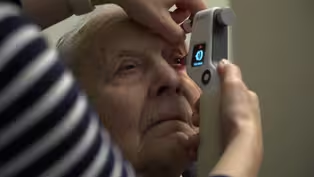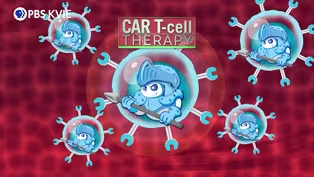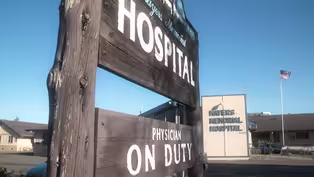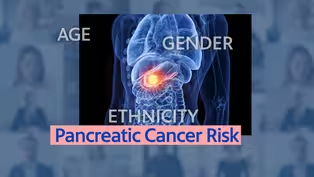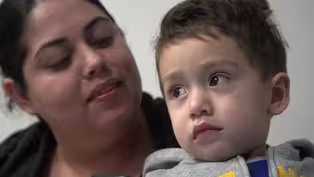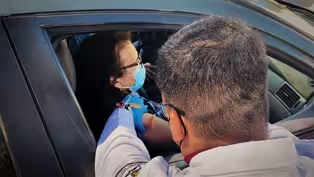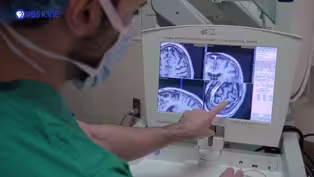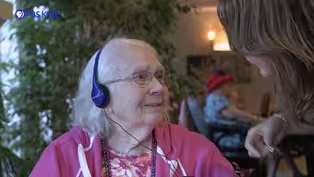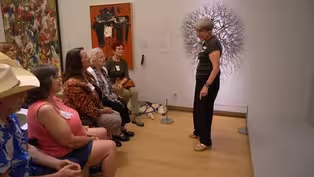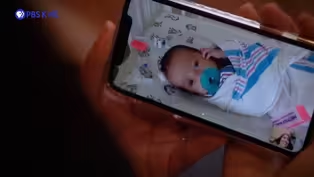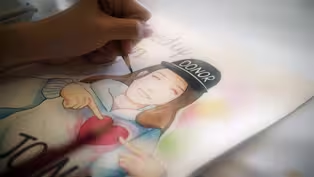KVIE Digital Studios
World’s Smallest Pacemaker | Focus on Health
6/3/2022 | 6m 7sVideo has Closed Captions
UC Davis Health uses the world’s smallest pacemaker to help keep kids’ hearts healthy.
The smallest pacemaker in the world is now being placed into some very small patients with help from Pediatric Electrophysiologist Daniel Cortez of UC Davis Health. Learn how an innovative procedure using a pacemaker the size of a vitamin capsule is helping an 11-year old girl with a rare mitochondrial disease live a better life.
Problems playing video? | Closed Captioning Feedback
Problems playing video? | Closed Captioning Feedback
KVIE Digital Studios is a local public television program presented by KVIE
Focus on Health is sponsored by UC Davis Health.
KVIE Digital Studios
World’s Smallest Pacemaker | Focus on Health
6/3/2022 | 6m 7sVideo has Closed Captions
The smallest pacemaker in the world is now being placed into some very small patients with help from Pediatric Electrophysiologist Daniel Cortez of UC Davis Health. Learn how an innovative procedure using a pacemaker the size of a vitamin capsule is helping an 11-year old girl with a rare mitochondrial disease live a better life.
Problems playing video? | Closed Captioning Feedback
How to Watch KVIE Digital Studios
KVIE Digital Studios is available to stream on pbs.org and the free PBS App, available on iPhone, Apple TV, Android TV, Android smartphones, Amazon Fire TV, Amazon Fire Tablet, Roku, Samsung Smart TV, and Vizio.
Providing Support for PBS.org
Learn Moreabout PBS online sponsorshipMore from This Collection
Explore health topics in the Sacramento region, from robotically assisted surgery to baby massages. Videos sponsored by UC Davis Health.
UC Davis Rehabilitation Hospital | Focus on Health
Video has Closed Captions
The new UC Davis Rehabilitation Hospital maximizes the quality of patient care. (4m 15s)
UC Davis Eye Institute | Focus on Health
Video has Closed Captions
Explore the UC Davis Health Eye Institute, dedicated to advancing world-class eye care. (6m 23s)
CAR T-cell Therapy | Focus on Health
Video has Closed Captions
Explore UC Davis Health's Good Manufacturing Practice Facility. (6m 26s)
Rural Doctors & Nurses Program | Focus on Health
Video has Closed Captions
Discover why rural parts of Northern California are facing a shortage of doctors & nurses. (5m 59s)
Pancreatic Cancer Treatment | Focus on Health
Video has Closed Captions
Researchers are using new leading-edge biomedical engineering to treat pancreatic cancer. (4m 24s)
Spina Bifida | Focus on Health
Video has Closed Captions
Investigate this ground-breaking medical treatment developed by UC Davis Health. (5m 12s)
COVID Vaccine Outreach | Focus on Health
Video has Closed Captions
Aiming to bridge the gap to vaccine access in underserved communities. (4m 32s)
Deep Brain Stimulation | Focus on Health
Video has Closed Captions
Deep Brain Stimulation may help patients with movement disorders. (4m 50s)
Caregiver Simulator | Focus on Health
Video has Closed Captions
In-home caregivers are being better prepared by training in a home-like environment. (3m 44s)
Art and Wellness | Focus on Health
Video has Closed Captions
Can specialized experiences with art reduce the burden of chronic pain? (3m 33s)
Being There ... When You Can't | Focus on Health
Video has Closed Captions
UC Davis Children's Hospital's webcam program allows parents to see their babies in care. (2m 46s)
Donate Life Visual Arts Contest | Focus on Health
Video has Closed Captions
High schoolers educate their peers about organ donation through art. (4m 35s)
Providing Support for PBS.org
Learn Moreabout PBS online sponsorship(singing) ♪ I am safe, I am kind ♪ For many children, doing yoga, riding a bike, and being a big sister is no big deal.
But for those with medical challenges, like 11 year old Avery Clark, these are the moments her whole family is grateful for.
Avery has a disease called Mitochondrial DNA Deletion Syndrome.
Her red blood cells don't provide enough energy for her body and her vital organs.
So, it's truly an individualized disease, it seems like, and one that progresses in a really unique fashion.
So, we honestly never know what's sort of coming next.
That's what makes it, in a lot of ways, so incredibly challenging.
In the fall of 2021, the Clark family faced even more challenges when Avery was diagnosed with diabetes.
During that diagnosis, doctors also discovered a second degree heart blockage, a condition that was advancing.
Basically, she has an electrical problem, an electrical outage, basically, um, in her heart.
Not fully out.
It's still there, but it just is missing certain beats and it's delayed on certain beats.
The answer, they learned, was to have a pacemaker placed in Avery's heart to help it pick up the missing beats.
Her parents were apprehensive, even though this was a possible solution they had heard of before.
It's something that you're aware of.
So, at least, it was a phrase- Like, even some of the things we've done, like, a G-tube and a CGM- I never heard of those things.
Pacemakers, at least, is common knowledge, but then, when you Google it, it's- there's no, like, examples of a ten year old with it, right?
The doctor who would help Avery was Daniel Cortez, a pediatric electrophysiologist with UC Davis Health.
Basically, an electrician of the heart.
Dr. Cortez presented the Clark family with two options, a traditional pacemaker- that's the larger one you see on the right- and a new, leadless pacemaker, the smallest pacemaker in the world.
It was obvious, even in just seeing- Like, would you rather have this thing that's this big, that's full of wires, that has to be implanted, and has, like, this endless recovery time, or something this big that's gonna go through a simple incision?
It was a no-brainer for the Clarks.
No chest surgery, no wires, and very minimal downtime.
What really amazed them, aside from the size of this tiny device, was the timing.
Dr. Cortez had just arrived at UC Davis three weeks prior, and he was the first doctor in the nation to implant this device in a child.
He's now done the procedure more than a dozen times in children as young as two years old.
The way we, im- we place this is through a series of wires and very small, sort of, uh, tubes over the wires to dilate the neck vein.
And then, um- And then, I put one stitch on at the end to close it up, and I take that stitch out the next day.
The pacemaker is threaded through a blood vessel traveling from the neck to the heart, where it's ultimately released inside the right ventricle.
The child usually recovers within a day.
Can you help me with your sockies?
Thank you, Mommy.
Today, Dr. Cortez is able to remotely monitor Avery's heart through this device that sits right next to her bed.
It has a Bluetooth, uh, system that pairs with her device, so, similar to how your phone pairs with your car.
Uh, and so, it can actually send us all of the information from their device from home, through the cellular networks.
Now, we can finally, instead of waiting for every appointment at the end of the year to hopefully not reveal some terrible piece of information- which has been our story- we can hopefully stay ahead of it.
Avery, who, before getting her pacemaker, was having trouble getting through the school day without a nap, now has more energy than ever, more smiles for her family, and more time for her sisters.
She is happily getting through the day.
Every day I pick her up, "I had the best day, Mommy."
Comes home.
She wants to listen to music.
She wants to do something.
She does yoga with her grandma every day.
Eventually, Avery will likely have to have the pacemaker replaced, but Dr. Cortez says this one should last for years.
I hope that this allows her to not have to worry about her heart, for her parents not to have to worry about her heart for at least the next 13 years, if not more.
And I hope this allows her to just be able to be a... be a kid and still, you know, she still has some other medical, uh, necessities, but at least not worry about the cardiac aspect, the heart aspect of this.
Say, "Go Avery!"
Go Avery!
With Avery, all the difficulty of being in the hospital, it was a really grateful moment for us, 'cause it felt like we were in very good hands.
The Clarks encourage other parents who have children with rare diseases to have hope, knowing the next medical miracle could be just around the corner and could make a world of difference, just like it has for Avery.
Go, baby girl!
With Avery's future, it's a... it's a race against time with the degeneration that comes from her disease and the technology and treatment that we can provide to get ahead of it.
This pacemaker feels like... one of the few real wins we've gotten in this battle.
And our hope is that things like this and more things like this come along and let us keep track of this disease and get ahead of it, that give us treatment options that didn't exist before.
(singing) ♪ I am open-minded... ♪ (singing) ♪ This digital short is supported by UC Davis Health, home to the number one ranked medical center in Sacramento by U.S. News and World Report.
Learn more about their doctors and their passion for advancing health at health.ucdavis.edu.
Support for PBS provided by:
KVIE Digital Studios is a local public television program presented by KVIE
Focus on Health is sponsored by UC Davis Health.
